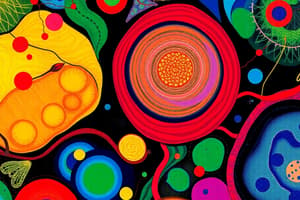Podcast
Questions and Answers
Cell theory is a fundamental concept in ______ that states that all living organisms are made up of cells
Cell theory is a fundamental concept in ______ that states that all living organisms are made up of cells
biology
Cells are the smallest independent units of ______
Cells are the smallest independent units of ______
life
The initial observations of cells began with Dutch microbiologist Anton van Leeuwenhoek's experiments with simple ______ in the 17th century
The initial observations of cells began with Dutch microbiologist Anton van Leeuwenhoek's experiments with simple ______ in the 17th century
microscopes
In 1838, the botanist Matthias Schleiden and the zoologist Theodor Schwann declared cells as the building blocks of all living ______
In 1838, the botanist Matthias Schleiden and the zoologist Theodor Schwann declared cells as the building blocks of all living ______
The principle that every living thing is composed of cells is a key tenet of the cell theory known as 'All Life Comprises ______'
The principle that every living thing is composed of cells is a key tenet of the cell theory known as 'All Life Comprises ______'
Cells exhibit the basic characteristics of life, including assimilation, growth, and ______
Cells exhibit the basic characteristics of life, including assimilation, growth, and ______
Cells divide to create more cells but never appear ______
Cells divide to create more cells but never appear ______
Each cell performs specific functions and contributes to the overall functioning of an organism. For example, nerve cells transmit electrical impulses, muscle cells ______, and skin cells protect against environmental factors.
Each cell performs specific functions and contributes to the overall functioning of an organism. For example, nerve cells transmit electrical impulses, muscle cells ______, and skin cells protect against environmental factors.
Some higher plants exhibit a super-symplasm of interconnected cells that does not fit with the classical cell theory. Additionally, certain multicellular organisms like coenocytes and syncytia do not conform to the idea of independent cells but rather consist of a single cytoplasm with multiple ______.
Some higher plants exhibit a super-symplasm of interconnected cells that does not fit with the classical cell theory. Additionally, certain multicellular organisms like coenocytes and syncytia do not conform to the idea of independent cells but rather consist of a single cytoplasm with multiple ______.
Today, cell theory remains a central concept in biology, providing a framework for understanding life at the most fundamental level. It continues to inform research in areas like genetics, developmental biology, and evolutionary studies. Despite ongoing refinements, the basic principles of cell theory remain intact, serving as a cornerstone of modern biological ______.
Today, cell theory remains a central concept in biology, providing a framework for understanding life at the most fundamental level. It continues to inform research in areas like genetics, developmental biology, and evolutionary studies. Despite ongoing refinements, the basic principles of cell theory remain intact, serving as a cornerstone of modern biological ______.
Study Notes
Cell Theory
Cell theory is a fundamental concept in biology that states, among other things, that all living organisms are made up of cells, cells are the smallest independent units of life, and all cells arise from pre-existing cells. This theory has shaped modern biology since its first articulation in the mid-to-late 19th century.
Early Observations and Developments
The initial observations of cells began with Dutch microbiologist Anton van Leeuwenhoek's experiments with simple microscopes in the 17th century. However, the full implications of cell theory did not fully emerge until improvements in microscopes in the 19th century facilitated clear visualization of the structures within cells.
In 1838, the botanist Matthias Schleiden and the zoologist Theodor Schwann simultaneously and independently declared cells as the building blocks of all living organisms. Their work built upon earlier observations of the nucleus, which was identified as a constant component of plant cells by Scottish botanist Robert Brown in 1833. These findings established the foundation for understanding the role of cells in life processes.
Key Tenets of Cell Theory
There are four primary tenets of the cell theory, as outlined by Jan Sapp:
-
All Life Comprises Cells: This principle emphasizes that every living thing is composed of cells, although some multi-cellular organisms may consist of special types of cells like neurons.
-
Cells Possess All Attributes of Life: Cells exhibit the basic characteristics of life, including assimilation, growth, and reproduction.
-
Cells Arise Only from Pre-Existing Cells: This tenet suggests that cells divide to create more cells but never appear spontaneously.
-
Cells Are the Structural and Functional Units of Life: Each cell performs specific functions and contributes to the overall functioning of an organism. For example, nerve cells transmit electrical impulses, muscle cells contract, and skin cells protect against environmental factors.
Challenges to Traditional Cell Theory
Despite the broad acceptance of cell theory, there have been challenges to its traditional formulation. For instance, some higher plants exhibit a super-symplasm of interconnected cells that does not fit with the classical cell theory. Additionally, certain multicellular organisms like coenocytes and syncytia do not conform to the idea of independent cells but rather consist of a single cytoplasm with multiple nuclei. These complexities have led to ongoing refinements and updates to the cell theory, particularly in the case of eukaryotic cells.
Cell Theory Today
Today, cell theory remains a central concept in biology, providing a framework for understanding life at the most fundamental level. It continues to inform research in areas like genetics, developmental biology, and evolutionary studies. Despite ongoing refinements, the basic principles of cell theory remain intact, serving as a cornerstone of modern biological thinking.
Studying That Suits You
Use AI to generate personalized quizzes and flashcards to suit your learning preferences.
Description
Explore the foundational principles of cell theory, including the origin of the concept, key tenets, and its significance in modern biological research. Learn about the challenges to traditional cell theory and how it continues to shape our understanding of life at its most basic level.




